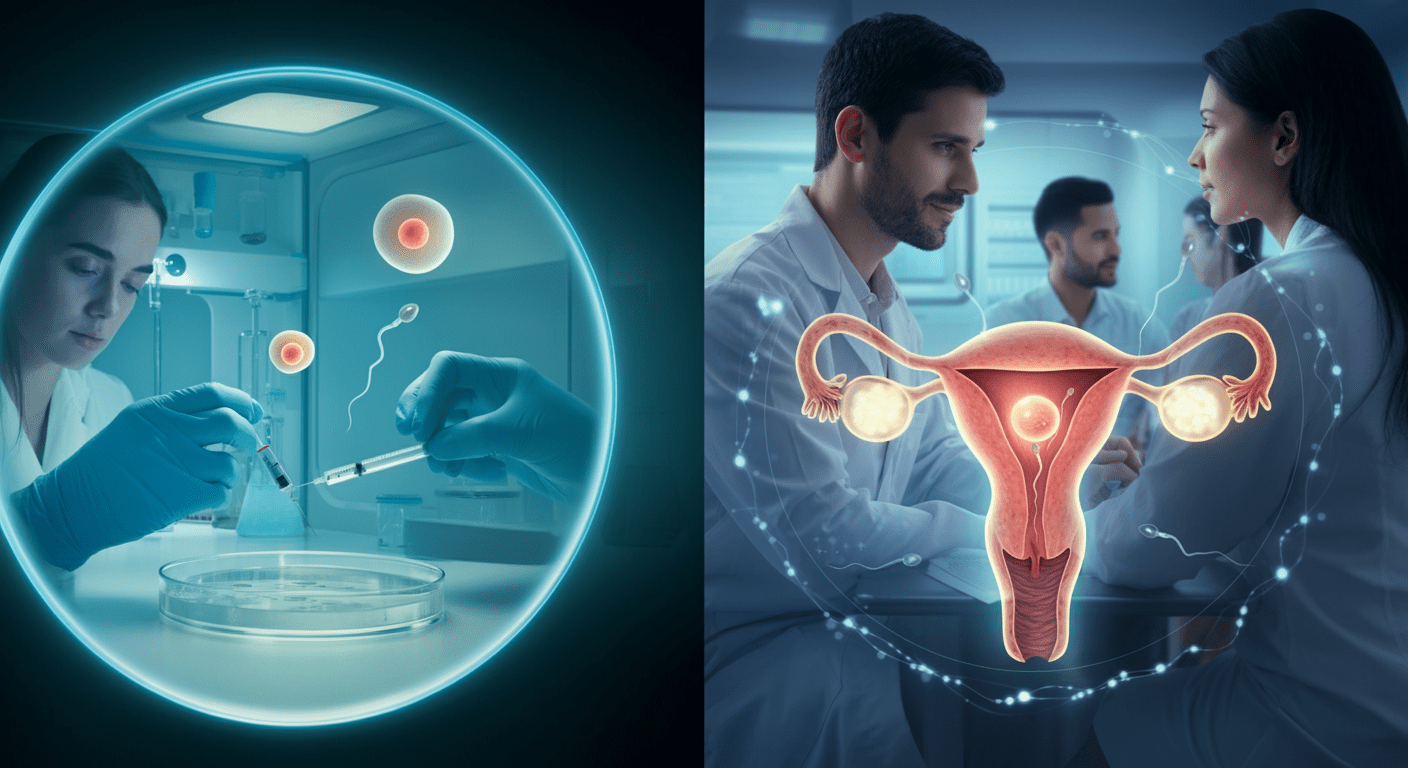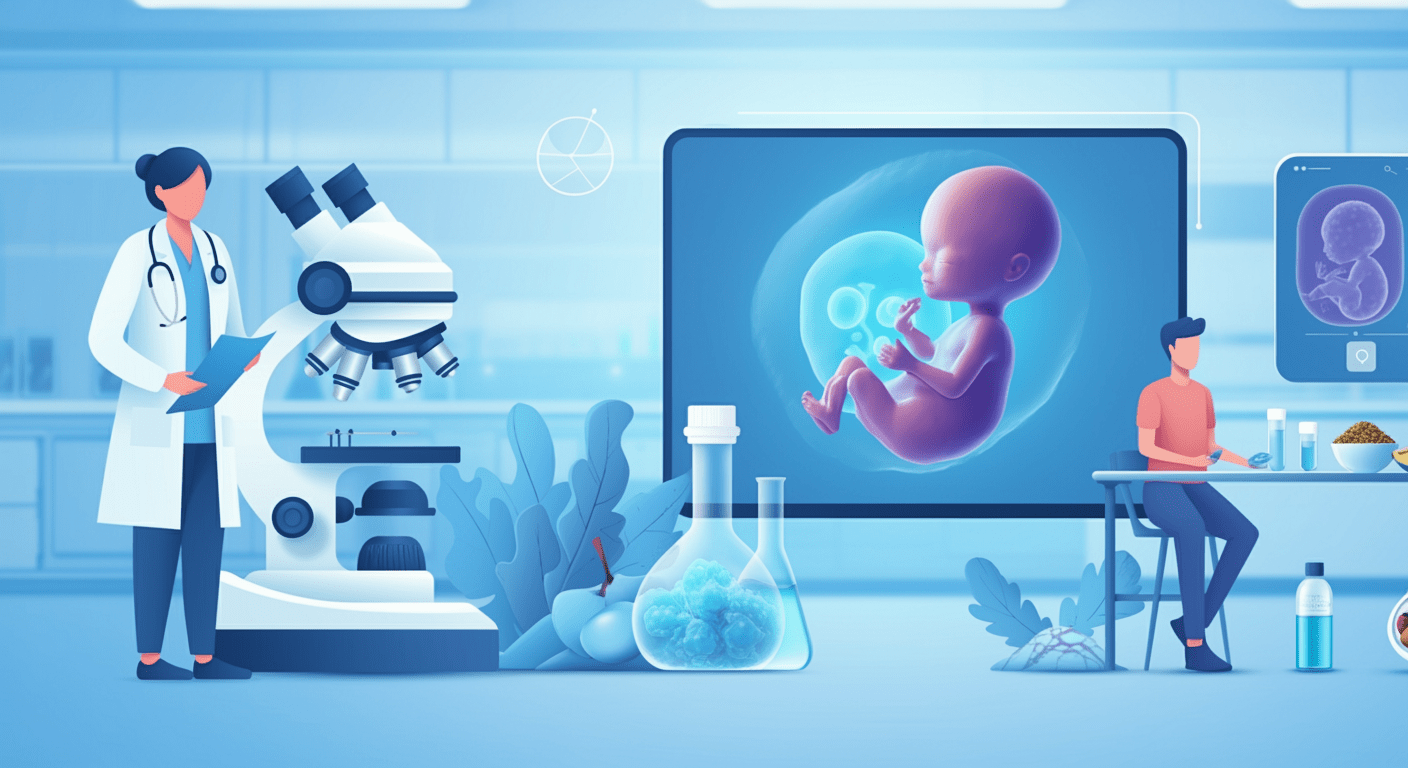The journey to parenthood can take different paths, with natural conception and assisted reproductive technologies like In Vitro Fertilization (IVF) being prominent options. Understanding the distinctions between these methods is essential for couples and individuals making informed decisions about their reproductive health.
Natural Conception: The Biological Process
Natural conception occurs when sperm fertilizes an egg within a woman’s body, typically in the fallopian tubes, following sexual intercourse. The process involves several critical stages:
- Ovulation: A mature egg is released from the ovary.
- Fertilization: Sperm meets the egg in the fallopian tube, leading to fertilization.
- Embryo Development: The fertilized egg, now called a zygote, undergoes cell division, becoming a blastocyst.
- Implantation: The blastocyst travels to the uterus and implants into the uterine lining, initiating pregnancy.
In Vitro Fertilization (IVF): An Assisted Approach
IVF is an advanced reproductive technology where fertilization occurs outside the body in a controlled laboratory setting. The standard IVF process includes:
- Ovarian Stimulation: Hormonal medications stimulate the ovaries to produce multiple eggs.
- Egg Retrieval: Mature eggs are collected from the ovaries using a minor surgical procedure.
- Fertilization: Eggs are fertilized with sperm in a laboratory environment.
- Embryo Culture: Fertilized eggs develop into embryos over several days.
- Embryo Transfer: One or more embryos are transferred into the woman’s uterus for potential implantation.
Key Differences Between IVF and Natural Conception
1. Location of Fertilization:
- Natural Conception: Occurs within the fallopian tubes.
- IVF: Takes place in a controlled laboratory environment.
2. Control Over Timing:
- Natural Conception: Relies on the body’s natural ovulation cycle.
- IVF: Allows precise timing of egg retrieval and fertilization, offering more control over the conception process.
3. Number of Eggs Involved:
- Natural Conception: Typically involves a single egg per cycle.
- IVF: Multiple eggs are retrieved and fertilized to increase the chances of successful implantation.
4. Hormonal Intervention:
- Natural Conception: No external hormonal support is required.
- IVF: Involves hormonal medications to stimulate egg production and support the uterine lining for implantation.
5. Success Rates:
- Natural Conception: Varies based on age, health, and fertility factors.
- IVF: Offers higher success rates for individuals with specific infertility issues, though success rates decline with age.
6. Monitoring and Intervention:
- Natural Conception: Minimal medical intervention with standard prenatal care.
- IVF: Requires intensive monitoring, including frequent ultrasounds and blood tests, to track progress and adjust treatments as necessary.
Embryo Development and Implantation: A Comparative Overview
In natural conception, after fertilization in the fallopian tube, the embryo travels to the uterus, where it implants into the uterine lining. This journey allows the embryo to develop in a natural environment from the earliest stages.
Conversely, in IVF, fertilization occurs in a laboratory, and embryos are cultured for several days before being transferred to the uterus. This external handling allows for selecting embryos with the highest potential for successful implantation and development.
Ayurvedic Perspectives on Fertility: Insights from Charaka Samhita
Ayurveda, the traditional system of medicine in India, offers unique insights into fertility and reproductive health. Texts like the Charaka Samhita emphasize a holistic approach, focusing on overall health to promote natural conception. The Charaka Samhita identifies factors essential for conception, including:
- Shukra and Artava: Healthy reproductive tissues in males and females.
- Ambu: Proper nourishment and hydration of reproductive organs.
- Kshetra: A healthy uterine environment for implantation.
- Ritu (Timing): Conception is more likely when the body is in a balanced state and the menstrual cycle is regular.
Slok from Charaka Samhita:
Sanskrit: “गर्भः स्यात् स्नेहसम्पन्ने रसस्निग्धे ह्युपस्थिते | कालानुकूलसंपन्ने स्वस्थशुद्धानिले स्त्रिये ||”
English Translation: “Conception occurs when the reproductive tissues are nourished, the body is well-hydrated, the environment is favorable, and the woman is in a healthy state with balanced doshas.”
Hinglish: “Garbha tabhi hota hai jab sharir poshit ho, ras snigdh ho, vat-pitta-kapha santulit ho aur sahi samay par yoni sukhad ho.”
The Charaka Samhita also recommends herbal formulations, dietary modifications, and yoga practices to enhance fertility naturally. Couples struggling with conception can incorporate these Ayurvedic principles to optimize their reproductive health alongside medical treatments like IVF.
IVF and Natural Conception: Health Outcomes
Concerns often arise regarding the health of children conceived via IVF compared to those conceived naturally. Research indicates that while there may be slight differences in birth outcomes, such as birth weight and preterm birth rates, the majority of IVF-conceived children are as healthy as their naturally conceived counterparts. It is essential to consider that factors like parental age and underlying health conditions can influence these outcomes.
Emotional and Psychological Considerations
The emotional journey differs between natural conception and IVF:
- Natural Conception: Couples may experience stress if conception does not occur as quickly as expected.
- IVF: The process can be emotionally taxing due to its invasive nature, the financial cost, and the uncertainty of outcomes.
At IVF Wiki, we understand the emotional and psychological aspects of fertility treatment. We not only help individuals and couples find the best IVF centers in India but also provide dedicated counseling sessions to support them through their journey. Our expert guidance ensures that each couple makes informed decisions with confidence and clarity.
Conclusion
Understanding the key differences between IVF and natural conception is vital for making informed reproductive choices. While natural conception follows the body’s intrinsic processes, IVF offers an alternative for those facing fertility challenges, providing hope and potential pathways to parenthood. Incorporating holistic approaches, such as those from Ayurveda and Charaka Samhita, can complement these methods by promoting overall health and well-being.
At IVF Wiki, we are dedicated to assisting individuals and couples in choosing the best IVF centers in India, ensuring they receive comprehensive care tailored to their unique needs. In addition to providing expert recommendations for fertility clinics, we also offer counseling sessions to help couples navigate the emotional and physical challenges associated with IVF treatment. Whether you are exploring natural conception methods or considering IVF, having the right guidance and support can make all the difference on your journey to parenthood.
Frequently Asked Questions (FAQs)
1. What is the main difference between IVF and natural conception?
The primary difference between IVF and natural conception is the location where fertilization occurs. In natural conception, fertilization takes place inside the fallopian tubes, while in IVF, it occurs in a laboratory before the embryo is transferred to the uterus. IVF Wiki helps individuals and couples find the best IVF centers in India for personalized fertility treatments.
2. Is IVF more successful than natural conception?
Success rates vary depending on age, health, and fertility conditions. IVF provides a higher chance of conception for couples facing infertility issues, whereas natural conception depends on natural fertility cycles. IVF Wiki offers counseling sessions to guide couples through the process and increase their chances of success.
3. What does Ayurveda say about conception and fertility?
According to Charaka Samhita, successful conception requires balance in the body’s elements. It emphasizes the importance of a healthy reproductive system (Shukra and Artava), proper nourishment (Ambu), and a suitable uterine environment (Kshetra). Ayurvedic treatments focus on lifestyle, diet, and herbal support to enhance fertility.
Slok from Charaka Samhita:
Sanskrit: “गर्भः स्यात् स्नेहसम्पन्ने रसस्निग्धे ह्युपस्थिते | कालानुकूलसंपन्ने स्वस्थशुद्धानिले स्त्रिये ||”
English Translation: “Conception occurs when the reproductive tissues are nourished, the body is well-hydrated, the environment is favorable, and the woman is in a healthy state with balanced doshas.”
Hinglish: “Garbha tabhi hota hai jab sharir poshit ho, ras snigdh ho, vat-pitta-kapha santulit ho aur sahi samay par yoni sukhad ho.”
IVF Wiki integrates both modern medical treatments and Ayurvedic knowledge to guide couples toward holistic fertility solutions.
4. Is IVF safe for both mother and baby?
Yes, IVF is a well-researched and safe procedure, with most IVF babies being as healthy as naturally conceived children. Some studies suggest a slight increase in preterm births, but overall health outcomes remain positive. IVF Wiki provides expert consultations to help couples make informed decisions.
5. Can lifestyle and diet improve IVF and natural conception success rates?
Yes, maintaining a healthy diet, reducing stress, and avoiding harmful habits can significantly improve fertility. Ayurveda, as per Charaka Samhita, suggests consuming fertility-enhancing herbs, maintaining hormonal balance, and following seasonal routines (Ritu) for better reproductive health. IVF Wiki helps couples prepare for fertility treatments with expert dietary and lifestyle counseling.
6. How long does an IVF cycle take, and how many attempts are needed?
A single IVF cycle typically takes 4-6 weeks, but the number of cycles required varies per individual. Some couples conceive in their first cycle, while others may need multiple attempts. IVF Wiki assists in finding experienced IVF specialists to maximize success rates.
7. Does IVF cause emotional or psychological stress?
Undergoing IVF can be emotionally and mentally challenging due to high expectations, financial investment, and medical procedures. IVF Wiki provides dedicated counseling sessions to support couples throughout their fertility journey, ensuring they remain mentally and emotionally strong.







